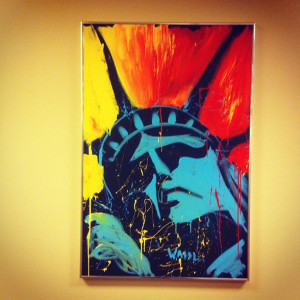
Cross-posted from The-Protest.com
The problem with films like the Hunger Games series is that, no matter how clear their parallels to contemporary violence and inequality, the takeaway message is ultimately one of reassurance. As they leave the theater, audiences can take comfort in the knowledge that the society depicted on-screen is far worse than the one in which they live. America has its flaws, they may think to themselves, but at least we don’t round up kids and force them to kill each other!
The truth is not nearly so reassuring. While the United States may not hold Reaping ceremonies, its economic lottery is just as grimly effective when it comes to channeling working-class teens into the military to kill other poor kids in the Third World. That the Hunger Games fails to make such connections explicit is not the fault of author Suzanne Collins, who has said her books were partially inspired by media coverage of the Iraq War. Nor is it the fault of the filmmakers who brought her vision to the screen. It is, rather, an illustration of the limits of dystopian fiction.
Dystopian fiction can enlighten through its depictions of nightmarish societies, but it can also obscure. This is true even of genre classics like Orwell’s Nineteen Eighty-Four. By dressing up contemporary critiques in futuristic or foreign clothing, by presenting colorful villains and sensational portrayals of evil, dystopian fiction can blind us to the calculated cruelties of the real world, which rarely announce themselves with the heavy-handedness of Collins’ Peacekeepers or Orwell’s Thought Police. The result is that even politically-savvy people tend to see such stories as cautionary tales about far-off threats rather than calls to action in the here and now.
This exotification of evil raises larger questions about our society’s apparent inability to face the most pressing issues of the day head-on. Why must we construct elaborate fantasies of totalitarian rule and savage blood sports? Are the evils of liberal democracy – imperialist war, the prison-industrial complex, mass deportation – not serious enough to warrant resistance? These are the questions that today’s artists must grapple with. But it is far easier to write about revolution in a fictional society than in one’s own backyard.
It is also safer. Alan Moore, the author of the graphic novel V for Vendetta, captured this feeling when he told MTV that the film adaptation of his work had been “turned into a Bush-era parable by people too timid to set a political satire in their own country.†Indeed, when stripped of what Martin Luther King, Jr., called the “fierce urgency of now,†such works not only fail to challenge the status quo, but help to reinforce it by redirecting anti-government impulses against imaginary targets. In this way, people can purge themselves of subversive feelings by cheering for freedom fighters at the multiplex and then return to being spied on by the National Security Agency without noticing any contradiction.
Dystopian works like the Hunger Games series are important. They raise questions of complicity, collaboration and resistance that often go unexplored in other genres. But until artists are willing to speak frankly about the time and place in which they live, hope for a better future – like their visions of dystopia – will be just another fantasy.